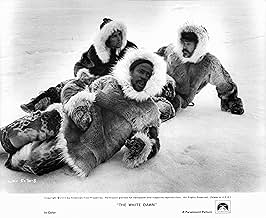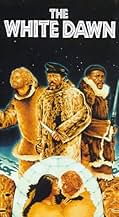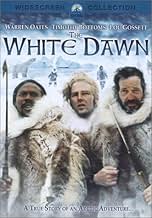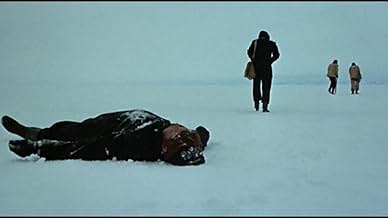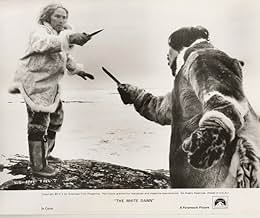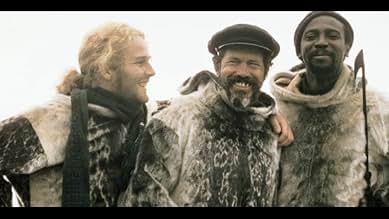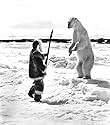In 1896, three survivors of a whaling ship-wreck in the Canadian Arctic are saved and adopted by an Eskimo tribe but frictions arise when the three start misbehaving.In 1896, three survivors of a whaling ship-wreck in the Canadian Arctic are saved and adopted by an Eskimo tribe but frictions arise when the three start misbehaving.In 1896, three survivors of a whaling ship-wreck in the Canadian Arctic are saved and adopted by an Eskimo tribe but frictions arise when the three start misbehaving.
Louis Gossett Jr.
- Portagee
- (as Lou Gossett)
Ann Meekitjuk Hanson
- Neevee
- (as Pilitak)
Featured reviews
There's a lot to admire about this movie, but very little to enjoy. Crusty old Warren Oates really sinks his teeth into the role of a crusty old whaler, shipwrecked among the Eskimos. The native actors are brilliant. The authentic arctic scenery is beautiful, the native culture is intriguing, the ending is powerful and tragic.
The problem is that everything that happens is so damned predictable. The story is told in such a portentous, pretentious way, like the film makers think they're saying something incredibly profound about the failures of the white man's civilization. But there's nothing said here that wasn't said much better in books like TYPEE by Herman Melville, or even earlier movies like A MAN CALLED HORSE starring Richard Harris.
I mean, sure, the drunken whalers behave like pigs. And sure, you can see why the Eskimos reach their breaking point and start fighting back. But the dated Sixties bias of the film makers is so pitifully obvious. The preaching drags the drama down time and again. You really expect Oates' character to start shouting "Grease 'em all! Torch this place!" like he's Sergeant Barnes in Platoon. And you really expect the young, blonde sailor to start crooning "make love, not war," while he's balling the hot young Eskimo chick.
This isn't a movie about real Eskimos and real whalers -- it's a hippie film maker's fantasy about demonized whites and idealized natives.
The problem is that everything that happens is so damned predictable. The story is told in such a portentous, pretentious way, like the film makers think they're saying something incredibly profound about the failures of the white man's civilization. But there's nothing said here that wasn't said much better in books like TYPEE by Herman Melville, or even earlier movies like A MAN CALLED HORSE starring Richard Harris.
I mean, sure, the drunken whalers behave like pigs. And sure, you can see why the Eskimos reach their breaking point and start fighting back. But the dated Sixties bias of the film makers is so pitifully obvious. The preaching drags the drama down time and again. You really expect Oates' character to start shouting "Grease 'em all! Torch this place!" like he's Sergeant Barnes in Platoon. And you really expect the young, blonde sailor to start crooning "make love, not war," while he's balling the hot young Eskimo chick.
This isn't a movie about real Eskimos and real whalers -- it's a hippie film maker's fantasy about demonized whites and idealized natives.
This little-known film of Philip Kaufman's is a look at a culture not seen much in films, that of the Innuit, or Eskimo people of Arctic Canada. Three whalers (Warren Oates, Timothy Bottoms and Louis Gosset Jr.) are stranded among them after a shipwreck. The year is 1896 but it could just as well be 1996 or 1796 as far as we can tell in this simple world where survival against nature is always the biggest concern. Surprisingly to me, the culture clash does not seem to be that great through most of the movie, and when it comes, it does so rather quickly. I think this makes for a less strong film but it's still an interesting one that really fascinates at times.
Cinematographer Michael Chapman ('Raging Bull') provides some great shots of the Great White North and Henry Mancini's score is very nice also. Martin Ransohoff is usually known as a producer but co-wrote the script here with Thomas Rickman.
Cinematographer Michael Chapman ('Raging Bull') provides some great shots of the Great White North and Henry Mancini's score is very nice also. Martin Ransohoff is usually known as a producer but co-wrote the script here with Thomas Rickman.
I saw this film last year at the Chicago International Film Festival with Philip Kaufman and Prof. Annette Insdorf presenting and I was totally blown away. It is both a beautiful love story between a white man and an Inuit woman and a big, spectacular adventure film. There are some amazing scenes, one involving polar bear (this scene alone is amazing and worth seeing the film for) , seal hunting, walrus hunting, boating in the treacherous ice-floes, etc. The performances are excellent from Timothy Bottoms , Warren Oates, Louis Gosset, Jr. and the wonderful actors of the Inuit community. The film continually takes your breath away and has some of the most beautiful love scenes I've ever seen. It's apparently based on a true story of the first encounter of the Inuit with the Dog Children (us). The film has some heartbreaking scenes (which I won't discuss) and the acting by the untrained Inuit actors is truly spectacular. I can't recommend this film enough.
Full disclosure I only watched this film because I admire Warren Oates and I had recently watched The Paper Chase and enjoyed Timothy Bottoms in that movie. I had only a vague notion of the theme of White Dawn and checked it out from my local library.
To begin I disapprove of seeing this film as good vs bad or savage vs civilized. I see far too many summaries of this film through that lens. The story, evidently, based on real events and was subject of a novel of the same name White Dawn, tells of four men who were part of an American whaling vessel in the Baffin Bay and while on a whale hunt are wrecked and stranded on the Baffin Island. The ship thinking those men dead turn about and sail home. One of the four stranded men died early on and we know nothing of him. The three remaining men struggle across the frozen barren until fortuitously they are discovered by some Inuits. The men are taken in and fed and provided shelter. Over time the men are initially given respect and are given wives, although Oates character is a devious man who wins his wives in a game. Naturally there are cultural misunderstandings and this eventually turns to friction. The Inuits are occasionally visited by a shaman who warns the tribe the newcomers are trouble. Somewhat a slow film but it builds to a tragic end.
The film is beautifully shot. We see a seal and walrus hunt and it appears to give an authentic look at Inuit life. I say appears because I am no authority on the Inuits, but the author of the novel, James Houston, on which the film was based lived with the Inuits to learn their ways, so I am trusting his observations. We see the Inuit life is hard and simple. It alludes the Inuits occasionally suffer from starvation. The film was shot on location where the events happened. You get a sense of the isolation of the place.
Overall I enjoyed the film, mainly because I was fascinated with a look at a people oftentimes forgotten and of the location which is isolated and formidable. Oates, Gossett and Bottoms deliver great performances.
To begin I disapprove of seeing this film as good vs bad or savage vs civilized. I see far too many summaries of this film through that lens. The story, evidently, based on real events and was subject of a novel of the same name White Dawn, tells of four men who were part of an American whaling vessel in the Baffin Bay and while on a whale hunt are wrecked and stranded on the Baffin Island. The ship thinking those men dead turn about and sail home. One of the four stranded men died early on and we know nothing of him. The three remaining men struggle across the frozen barren until fortuitously they are discovered by some Inuits. The men are taken in and fed and provided shelter. Over time the men are initially given respect and are given wives, although Oates character is a devious man who wins his wives in a game. Naturally there are cultural misunderstandings and this eventually turns to friction. The Inuits are occasionally visited by a shaman who warns the tribe the newcomers are trouble. Somewhat a slow film but it builds to a tragic end.
The film is beautifully shot. We see a seal and walrus hunt and it appears to give an authentic look at Inuit life. I say appears because I am no authority on the Inuits, but the author of the novel, James Houston, on which the film was based lived with the Inuits to learn their ways, so I am trusting his observations. We see the Inuit life is hard and simple. It alludes the Inuits occasionally suffer from starvation. The film was shot on location where the events happened. You get a sense of the isolation of the place.
Overall I enjoyed the film, mainly because I was fascinated with a look at a people oftentimes forgotten and of the location which is isolated and formidable. Oates, Gossett and Bottoms deliver great performances.
have some respect for and knowledge of tribal cultures where the shamans have authority, the people are "tuned in" to the natural world, and "nature magic" is understood on a gut level by everyone from childhood onward. I saw this film many years ago and loved it; it's still excellent. If you like it, you may want to read "The Heart of the Hunter" by Laurens Van Der Post, a classic about the Bushmen in South Africa. This film will be of value to anyone who has someone in their family who's made a mess of his or her life because of alcohol. Grab the drinker and make him or her watch it and that person may get a sense for how destructive that behavior is. Anyone who wants to learn about the Bear Spirit will learn something here as well.
Did you know
- TriviaAccording to producer Irwin Winkler, this movie was the main factor in his decision to invite director Philip Kaufman to direct L'étoffe des héros (1983). Portions of Henry Mancini's score for this film can be heard in the later film.
- Alternate versionsThe film was originally given an "R" rating from the MPAA due to the nudity which was then edited for the film to receive a "PG" rating.
- ConnectionsReferenced in Realizing 'The Right Stuff' (2003)
- How long is The White Dawn?Powered by Alexa
Details
Box office
- Budget
- $1,700,000 (estimated)
Contribute to this page
Suggest an edit or add missing content

